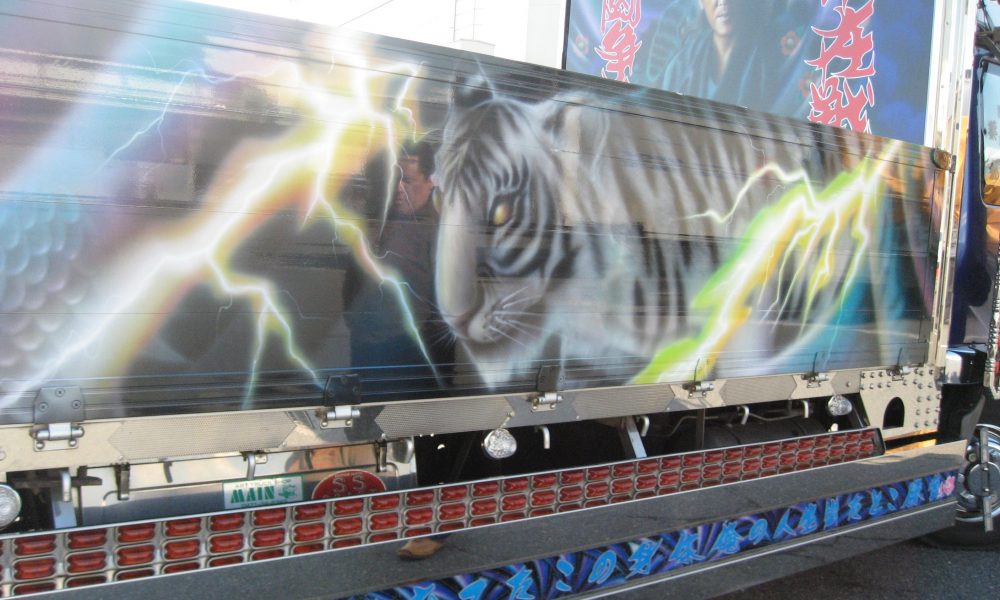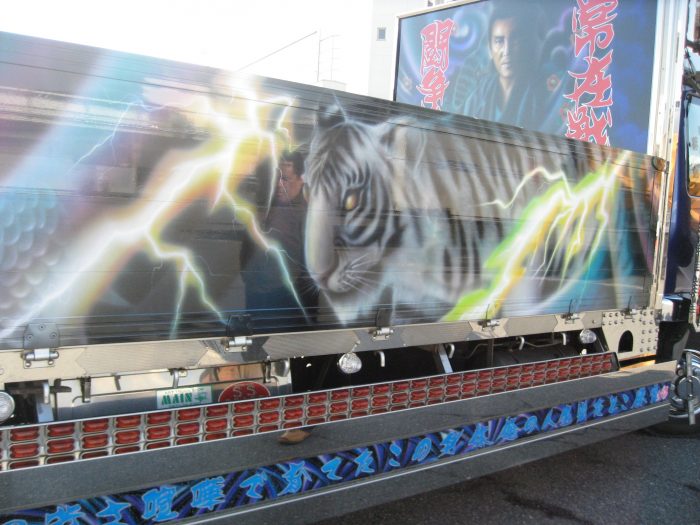
Others: Truck drivers Dekotora Magic
By Judit Kawaguchi
The roads of Japan are littered with an infinite number of sights that are out of the ordinary but one of the most unusual highlights is a pop phenomenon known as Dekotora.
Dekotoras (decorated trucks) first appeared on Japan’s roads about 30 years ago. Boasting shiny fenders, vibrant dashboards and airbrushed flanks, the decotoras that plied the roads in the 1970s brought a dash of color to the nation’s drab highways.

In fact the trucks attracted so much attention they caught the eye of an up-and-coming film producer, who decided to make a feature called Truck Yaro, which was released in 1975. Curious audiences flocked to the cinema to see the movie and, in the years that followed, decotoras gained a cult status that was previously unheard of.
In August this year, director Katsuki Hideyuki completed filming the third movie in the dekotora series at Shimizu Port. Entitled Flower of Love Blossoming, the film centers on a character called Shuichiro, who is played by the immensely talented Aikawa Show.
Producer Tamegoro Sudo, a jack of all trades, who gets up at 5am to bake bread before embarking on numerous errands, wanted to base the film’s main character on his own personality – self-assured and confident.
“Dekotora movies are filled with average people making mistakes and trying to fix their lives,” he says. “In this cycle of give and take, even if we are dealt a bad hand we can still survive by relying on the kindness of others.”
Actor Aikawa Show was perfect for the lead role, ensuring Shuichiro came across as an intense character who preferred to listen to other’s concerns and let his actions do the talking.
“Shuichiro’s up for anything as long as it is a good deed,” Oikawa Sho says. “He is gentle and passionate – a real edokko.”
Shuichiro is the ultimate folk hero, and a fitting tribute to the earliest decotora star of the silver screen, Hoshi Momojiro in the movie Truck Yaro. The main character was actually based on Yasuo Miyazaki, an amazing man who possesses a thin moustache and a smile that is almost as vast as his manners. Miyazaki, however, plays down his own contribution to the decotora scene.
“It could have been any of my buddies,” Miyazaki says with trademark nonchalance. “They are all more interesting than me. I just helped out with the script, that is all.”
Dekotora drivers are renowned for their modesty, something producer Sudo was keen to portray in the third film.
“They sacrifice their families, their homes, their whole lives for their trucks,” says Masayuki Takakuwa, editor of Truck King, a specialty magazine dedicated to these fantastic works of art. “Truck drivers usually do not make lots of money yet they spend all they’ve got, usually around ten million yen or about one hundred thousand U.S. dollars, to fix up their trucks – often more than the original price of the vehicle. Why? Because for them the truck is not just a machine but a beloved family member with a spirit. I guess animism is at the core of their feelings because we Japanese think everything has a soul. And for drivers who spend most of their time on the road, the truck is their home.”
Sano Takehiro, a softly spoken driver who owns five trucks, agreed. “We always talk to our trucks,” he says. “We ask them how they feel and thank them for working so hard with us. We love them!”
According to magazine editor Takakuwa, there are about 300,000 to 400,000 dekotoras in Japan. He dreams of one day taking some of these trucks abroad in order to spread the positive message of peace to all corners of the world.
But the roads are not all paved with gold for these exotic truck drivers, as renowned decotora artist Sekiguchi Misao himself notes. “I paint symbols to protect the drivers from accidents and the recession,” he says. “These are hard times, no doubt about it.”
A bilingual version of Judit Kawaguchi’s dekotora article series appeared in the Japanese magazine Truck King.
Reported at the shooting of “DECOTORA NO SHU – KOI NO HANA SAKU SHIMIZU KO” (Decorated Truck Driver Shu – Flower of Love Blossoming in Port of Shimizu).
A version of these interviews appeared in J SELECT November 2005 Issue.
This QuoteWe always talk to our trucks. — Dekotora Magic